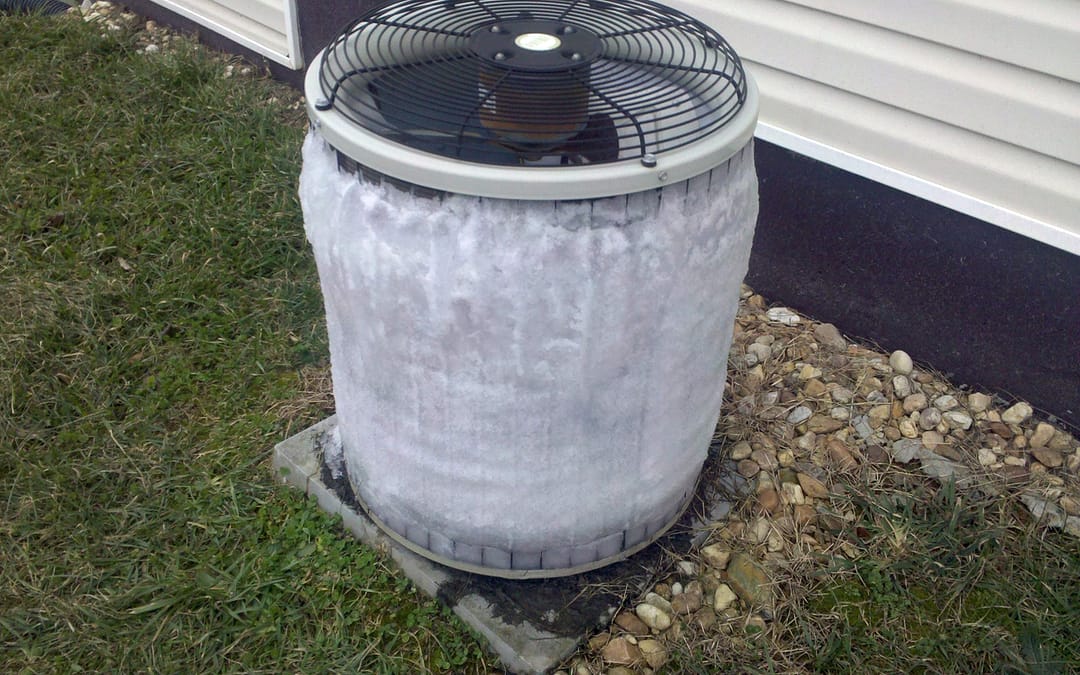What to Do When Your AC Unit is Freezing Up
AC freezing up?
It can be surprising to see a chunk of ice sitting on your AC system in the heat of summer. But this is a fairly common occurrence. An air conditioning unit is a self-contained system comprising of several interconnected and interdependent parts. A glitch in any one of these parts can result in serious issues. And this is essentially the case with frozen ac coils.
So, how does this happen, and what can you do when your AC unit is freezing up?
How Does an Air Conditioning System Work?
Often, people assume that air conditioning works by injecting cool air into a building. But this isn’t entirely true. In actuality, an air conditioner works by removing warm air from inside a room and pumping it outside, similar to how a refrigerator works. The only difference is that a fridge cools a small, insulated space while an air conditioner has a much bigger job cooling indoor spaces.
Air conditioning systems come in a variety of shapes and sizes, but they all work on the same basic premise. They contain chemicals (refrigerants) that convert from gas to liquid and back again quickly. These chemicals are contained inside coils that travel through a closed loop system. There are three stations along the route that manipulate the state, pressure, and temperature of the refrigerant. These stations are the evaporator coil, compressor, and condenser.
Station 1: Heat is absorbed by the evaporator coil
Firstly, warm air from a room is drawn into the air conditioner and over the evaporator coil through a vent. The heat is absorbed into the refrigerant, thereby turning it from liquid to gas. A fan then blows the cold air into air ducts that distribute it throughout a room. At the same time, the refrigerant, now in a gaseous state, continues to travel along the loop system toward the second station – the condenser.
Station 2: Compressor raises the refrigerant temperature
The cooling fluid makes its way outside the house to the compressor, where it reaches as a low-pressure gas and exits as a high-pressure, hot gas before moving on to the condenser.
The compressor’s role, as the name implies, is to decrease the gas’ volume by squeezing it tightly between two solid objects, raising its gaseous temperature even more.
Station 3: Heat is transferred outside
The refrigerant is an extremely hot vapor when it reaches the condenser, where it is exposed to the cool outside air. If you’ve ever peeked into your AC unit, you’ll notice metal fins all around the housing. The purpose of these fins is to dissipate heat more quickly. As a result, the refrigerant is significantly cooler when it leaves the condenser. It has also changed its state from a gas to liquid because of the high pressure. The refrigerant, which has transformed back into a cool liquid, is now ready to return to station 1 and repeat the process.
What Causes an AC Unit to Freeze?
Air conditioners freeze when there’s a glitch that disrupts the functioning of the evaporator coil, causing the refrigerant to cool too much, fall below freezing, and ice over. For this reason, frozen ac coils definitely indicate a problem with your AC’s health.
It’s important to understand what may cause your AC unit to freeze, so you can diagnose and fix the underlying problem. There are two things that can lead to an AC freeze-up:
Blocked airflow
Air conditioners need a constant flow of air to prevent humidity from settling on the coils and freezing. Dirty or clogged air filters could disrupt airflow, causing your systems to freeze up. That’s why it’s important to change your system’s filters every one to three months.
Mechanical problems or refrigerant leaks
An air conditioner is a machine full of moving parts that can shut down or get stuck. Fans can stop moving, filters can become clogged, and leaks can happen. If any of these disruptions were to cause a drop in pressure, the refrigerant would then expand too much and become extremely cold. Same case if there was a leak that resulted in low refrigerant levels.
Steps to Take to Keep Your AC from Freezing
Seeing your air conditioner encased in ice can be an alarming sight. Fortunately, proper maintenance can prevent this from ever happening.
Have your unit serviced at least once every 12 months. Or even twice yearly, depending on how often you use it. Your air conditioner has a lot of moving parts that require regular maintenance if it’s to serve you efficiently throughout its years of service.
Regular servicing ensures your system is functioning at optimal capacity, providing for faster and more efficient cooling. It also reduces the burden on your AC as small problems can be identified and rectified early. Plus, scheduled checkups minimize the likelihood of unexpected repairs. For instance, a qualified HVAC technician is also trained to check for refrigerant leaks. Low levels of refrigerant are a surprisingly common culprit of frozen ac coils.
Aside from scheduled maintenance, there are some tasks you can perform as a homeowner that could extend the life of your air conditioning system. Something as simple as replacing your system air filter each month could save you thousands of dollars in repair costs and prevent your system from freezing up when you need it most.
What to Do if Your AC Freezes Up
If your AC unit is left frozen for too long, you may end up with a bigger problem on your hands. Often the issue can be solved with a little troubleshooting. If not, you’ll need to call up a certified HVAC technician to have a look.
Here’s how you can go about solving this issue.
Step 1: Thaw
First things first, turn the AC off and let the ice melt. Don’t operate the system again until it completely defrosts and dries. Make every effort not to use your ac unit when it’s frozen, as this could unduly strain the compressor.
Note: The compressor is the most expensive component of your AC. Excessive strain could damage this valuable component leading to a costly repair service call or replacement. On that note, don’t be tempted to break up the ice so it can thaw faster – you could damage multiple parts. Be patient and give your AC system time to thaw and dry.
In some cases, letting the system thaw and dry is all you need to do to get it running normally again. Restore power to your system and turn the blower on.
Step 2: Find the Cause and Fix It
There are several factors that could be causing your air conditioner to freeze up:
Check air filters and change them
Air filters ensure clean air circulation in your home. They need to be cleaned or changed periodically to sustain optimal functioning. During peak seasons, you should be cleaning your AC filter at least every two weeks and replacing them after every three months.
Check your thermostat & fan settings
If the set temperature is too low, your AC may be unable to adequately transfer heat from the inside to the outside. Similarly, low fan speed can excessively strain your unit, giving it a hard time maintaining the set temperature. The solution is to increase the fan speed on especially hot days to maintain the necessary airflow.
Cool summer nights can cause your AC to freeze as it’s designed to operate within a set of temperature thresholds. On nights colder than the optimum threshold, the refrigerant becomes too cold and freezes any moisture in the air before it can even properly circulate.
Bad compressor
Now, this is the worst-case scenario. A worn-out compressor can’t effectively compress the refrigerant, which in turn leads to frozen AC coils. Unfortunately, you cannot fix a bad compressor. Here’s where you contact your HVAC provider for emergency support
Some air conditioning problems are relatively simple to sort out on your own. However, the more complicated glitches warrant an inspection from a qualified HVAC professional.

